
Refuting criticism of the 19th Amendment to the Constitution, senior constitutional lawyer and UNF MP Dr. Jayampathy Wickramaratne who was regarded as “the brains behind the 19th amendment”, rejected arguments that it was “an evil piece of legislation”, while stressing that the constitutional amendment enacted within the first four months of the Yahapalanaya Government’s term was not his prerogative.
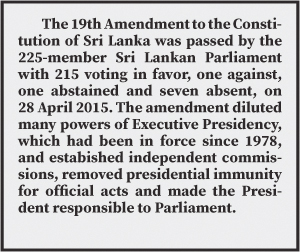 “It was not drafted just (only) by me, a Cabinet subcommittee headed by the Prime Minister was appointed after the January 8 victory, and various parties representing the government were appointed to this committee”.
“It was not drafted just (only) by me, a Cabinet subcommittee headed by the Prime Minister was appointed after the January 8 victory, and various parties representing the government were appointed to this committee”.
“The committee took the decisions. I too attended this committee as adviser to the President, a position I held at the time,” he said
“I am being asked now if this 19-A has a flaw, I say “yes”,
He attributed the ‘flaw’ to many changes it went through at the Committee stage and before, but he cautioned that repealing it now will not do any good to the country and its people. Instead, he opined that the flaws needed to be addressed though a 20th amendment, moving in the direction of totally empowering the Parliament.
Dr.Wickramaratne said a small group of lawyers, who had experience in Constitutional law, were assigned to prepare the initial draft of the amendment, in consultation with the cabinet Sub-committee. The original draft of 19-A, provided for the complete abolition of the executive presidency preserving the provisions which allowed the president to be elected by the people. This was retained since, the idea was not to make changes that will necessitate a referendum.
“That’s because we had told the country at the beginning that we will avoid a referendum. And we were aware that to change the mode of the election a referendum would be needed.”
“The president’s commitment was very clear - to abolish the executive presidency at the outset. We went along with that, and the cabinet subcommittee gave us direction. We also provided our own inputs.”
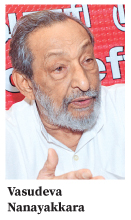 He said subsequently a draft was prepared and it was approved by the Cabinet.
He said subsequently a draft was prepared and it was approved by the Cabinet.
More changes were proposed later by the SLFP. By that time President had assumed the SLFP leadership. Dr.Wickremaratne opined that the people in the SLFP who were not with the President at the Presidential election but joined him later, had wanted to dilute the proposals.
And also MPs from some constituent parties in the UPFA who were then with President Sirisena and now in the UNF said not to give all these powers to the Prime Minister on the assumption that PM Wickremasinghe will be in office forever. “That was a big mistake on their part,” Dr.Wickremaratne said.
“I remember in March 2015, on a Sunday morning, an all party meeting was convened by the President where the PM was also present. At that discussion there were strong pressures, from the SLFP and UPFA parties, to water down the provisions.”
The UNP - the main constituent of the government - had to give in because they did not command even a simple majority in the parliament. The Bill that went to the Supreme Court (SC) was also diluted. The SC wanted certain changes made, because of our resolve to steer clear of a referendum. We cannot complain, that was bound to happen.
The original idea was to make the PM the head of the Cabinet. The original draft that was agreed to by the Cabinet Sub Committee and the Cabinet , proposed to make the president the Head of State and PM the Head of Cabinet.
Those were the original proposals. Then at the committee stage there were more dilutions. For example the laws to discourage cross-overs were dampened. The provisions were to stop the lower courts from hearing petitions by parliamentarians who cross-over .The Supreme Court was to retain that Jurisdiction.
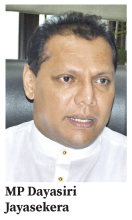 The MPs who crossed over to the other camp in the past, (to strengthen someone’s hands, etc.), get an injunction from the District Court and continue in parliament. They don’t lose their seats, thus the present provisions are ineffective. That needed to be stopped. But this was essentially blocked by the MPs who had themselves crossed-over.
The MPs who crossed over to the other camp in the past, (to strengthen someone’s hands, etc.), get an injunction from the District Court and continue in parliament. They don’t lose their seats, thus the present provisions are ineffective. That needed to be stopped. But this was essentially blocked by the MPs who had themselves crossed-over.
“And with regard to the composition of the Constitutional council – the original proposal was to have only three politicians and seven members from Civil Society, but the Opposition , (as I remember Vasudeva Nanayakkara specifically ) said there must be more members of parliament in the Constitutional Council. Therefore it was made seven MPs to three Civil Society representatives.”
He said at that stage the whole process to bring in the 19-A was about to break down. Mr.Wickremesinghe said he cannot agree to it. Then with his permission I spoke to Ven. Sobitha thera. Ven. thera said he was disappointed but ready to accept it, because if not the entire process will be sabotaged.
“When this Bill was brought before parliament president Sirisena took an interest and actively took part in getting the two thirds majority it needed.”
“I am being asked if this 19-A has a flaw, and I say ‘yes’ . The flaw is that due to so many changes the amendment has created two separate centres of power – president and prime minister. This is exactly what Dr. Colvin R de Silva said a constitution must ‘NOT have’.
When the 1972 constitution was being prepared and when J.R. suggested executive presidency, Dr.Colvin R. de Silva said don’t have two centres of power at the Apex of the state.
Then Dudley (Senanayake) said at the constituent assembly, opposing J.R.’s proposal – “this may have worked in France and the US for historical reasons but it won’t work for our kind of countries”. This is what we have now, two power centres, because the original 19-A was diluted.“I think we have gone quite close to parliamentary form of government, we must complete that,” he said it is the only way to fulfill the Janaury 8, 2015 promises made to the people and Ven.Sobhitha Thera.He said that the Sama Samaja party has always backed a parliamentary form of government. Referring to MP Dayasiri Jayasekera’s comments that he (Dr Wickremaratne) being the main architect of ‘ 19-A’, had deceived the president, Dr.Wickramaratna said, “I think president is above such baseless comments.”
****
Rajitha, Musthapha speak out
By Uditha Kumarasinghe
Health Minister Dr.Rajitha Senaratne: Actually what we promised to the people was to go far beyond the 19 th Amendment. That was our main slogan in the 2015 Presidential Election campaign. On that basis, we worked for the victory of President Maithripala Sirisena. If the President says now that the 19 A should be abolished, he should also quit his portfolio. The incumbent President took office to abolish the Executive Presidency.
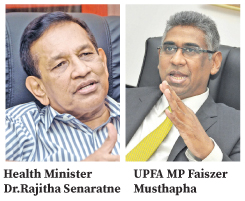 The President in front of the body of late Ven. Maduluwawe Sobitha thera pledged to abolish the Executive Presidency and go even beyond the 19th A. How has it changed today? Individuals may change but the country’s progressive forces and the people will not.
The President in front of the body of late Ven. Maduluwawe Sobitha thera pledged to abolish the Executive Presidency and go even beyond the 19th A. How has it changed today? Individuals may change but the country’s progressive forces and the people will not.
What I say is we should immediately bring the 20 th Amendment and abolish this Executive Presidency. If the Presidents are changed in this manner, it gives the impression that this presidential system should also be changed. Actually, there is no lacuna in the 19 A. The issue here is that it has not been properly constituted and also as to how the powers given to the independent commissions should be properly exercised. This can be rectified by bringing in necessary rules and regulations.
There is no need whatsoever to abolish the 19A. This country should be taken forward to further ensure democracy, freedom of the people and their rights, as we are moving towards a modern world.
UPFA MP Faiszer Musthapha: There are certain practicalities with regard to enforcement of the 19-A. Both the President and the Prime Minister have powers. Unless there is consent on the appointment of Cabinet Ministers and if you don’t get the consent of the President and the Prime Minister, you can’t appoint the Cabinet.
So there can be a breakdown situation. We all supported the 19-A in good faith. But if that legislation needs amendments as the President and the Prime Minister pointed out, it creates two leaders. If there is a deadlock, it will impact the whole country.
Actually, it is not a question of who is the brainchild of the 19-A , and except for one, all Parliamentarians voted for it. So the fact remains, in this legislature there are issues with regard to governance and creation of two leaders. When you create two leaders the smooth functioning of government administration can come to a standstill. My personal view is that the 19 th Amendment should not be repealed. The 19-A has potholes with regard to smooth functioning of the government.
****
19A: step towards democratisation - JVP
The 19 th amendment abolished 18-A, if the President says both have to be repealed, then he is not very conversant with the Constitution.
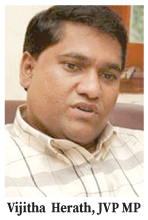 Let’s not forget that he was one of the attesters to the the 18-A, an amendment that paved the way for a dictatorship- It abolished the independent commissions. The 19-A took away some dictatorial powers of the executive presidency and re-established the independent commissions. It was a forward step towards strengthening democracy in the country.
Let’s not forget that he was one of the attesters to the the 18-A, an amendment that paved the way for a dictatorship- It abolished the independent commissions. The 19-A took away some dictatorial powers of the executive presidency and re-established the independent commissions. It was a forward step towards strengthening democracy in the country.
Our opinion is that the executive presidency should be completely abolished. That is the reason why we want to bring in the 20th Amendment. But we feel that 20-A might not happen before the next election due to practical difficulties. We agree that 19-A was a temporary solution, we also know that the country cannot move forward with the 19-A as it is.
However, it is wrong to say 19-A was a mistake. After it was passed in Parliament, the President proudly announced that he was the only sitting president that agreed to prune his own powers. This final amendment to the constitution brought in many democratic reforms. We are against giving sweeping powers to the Prime Minister also, our stand is that it is Parliament which should be empowered.
It is not practical to repeal 19-A now. First of all, it must have two thirds majority in parliament and that is impossible before the upcoming Presidential election. Many original provisions in the proposed law were diluted by the opposition and ultimately what passed was an altered version of the original proposal. That led to this mess. The UPFA and the SLFP are partly responsible for it.
We believe the two power centres were created since the President decided to assume leadership of the SLFP. It would not have arisen if he remained as an independent common candidate.
